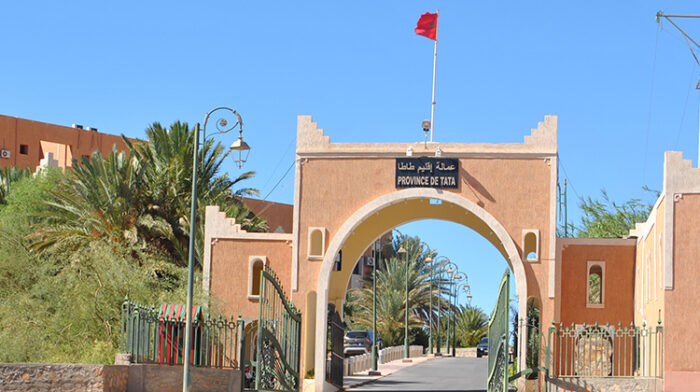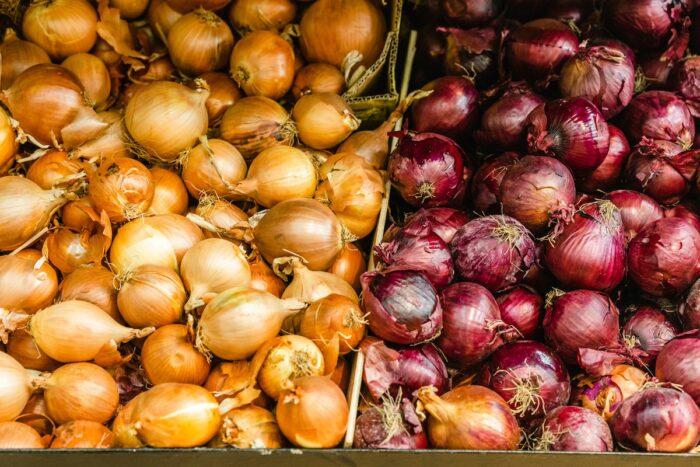It’s true that the restrictions imposed on us have had a financial impact, but we’re aware that it’s in our own interest, » admits Moulay Ahmed Errahmani, head of Alhibat Négoce, a company based in Tata specializing in the export of Moroccan fruit and vegetables. In this town in south-east Morocco, the local population lives mainly from agriculture.
But in 2022, local authorities banned farmers from growing watermelon, one of the region’s flagship fruits. The objective behind this decision is to preserve as much as possible the local groundwater, which for years has been subject to intensive cultivation of watermelon, a very water-hungry crop. All the more so as Morocco is experiencing its sixth successive year of drought.
« This drought is nothing new. Everyone here agrees on this observation, which is no longer debatable. And while other regions of Morocco are more or less affected by the drought, here in Tata we’re almost dry. This year, there’s hardly been any rain, » laments Moulay Ahmed Errahmani. « We’re going to need four or five successive years of rain to make up for it and get the groundwater we’re used to working with back to where it was before, » he says.
Two years without watermelons
It’s been two seasons since this farmer has grown a watermelon. « In neighboring regions such as Zagora and Guelmim, the restrictions only concerned a reduction in the areas dedicated to this crop, not like Tata where it’s totally forbidden« , he recalls. According to the decision taken by the local authorities, farmers in Zagora can still grow watermelon and melon, provided they do not exceed a maximum area of one hectare. In areas close to watercourses, such as rivers or oases, the ban is total.
In Tata, the situation is more critical. This explains the ban on this crop in the town and surrounding area. « It’s a very popular activity here. It used to put everyone in the region to work, and Tata watermelon is in great demand on European markets, which is pushing some farmers towards excessive cultivation. The profitability of watermelon is also encouraging farmers to invest in large surfaces. This makes export sales easier than for other crops, » confides our source.

In Tata, watermelon exports used to start in March and continue until May. « Personally, I exported watermelon to the Rungis and Perpignan markets in France, Utrecht in the Netherlands and Spain too. The Tata region alone exported almost 110,000 tons every year, mainly to European markets, with almost 4,000 hectares under cultivation. Today, there’s nothing left to export », he laments.
According to Moulay Ahmed Errahmani, who is part of a control commission appointed by the governor, all farmers in the region have complied with the restrictions decided in 2022. « We have followed this closely with the members of the commission, and to the best of my knowledge, no breaches have been recorded here« , he assures us.
In Laaouamra, a commune renowned for growing red fruit and watermelon in the province of Larache, Mehdi*, a farmer-exporter who wishes to remain anonymous, hardly grew any watermelons this year. Nor in Zagora, where until recently he owned a watermelon farm. « I just grew a hectare in Ouarzazate and a little less here in Laaouamra, without much expectation. I just did it out of habit. Already last year, the seeds were affected by a virus, which affected the whole Laaouamra crop. As soon as the fruit reached maturity, it exploded on its own from the inside« , he recalls.
« Alternative » crops
And while watermelon growing is a « very profitable market« , it can « also be very dangerous, like wheat or the stock market« , he points out. « Last year, I witnessed the sale of a product destined for Spain, which left Zagora at 7 dirhams a kilo and ended up at 3 dirhams in Tangier Med. All it takes is for temperatures to drop, even temporarily, for the price per kilo to plummet« , warns Mehdi.
Mehdi is also aware that this fruit, which is very popular in summer, consumes far too much water. « You have to water watermelon morning and night. It’s like giving a child a glass of Coke with a straw – you can imagine the scene. If you don’t have enough water to regenerate what you consume, you can easily fall into rupture« , he admits.
Faced with the difficulties associated with watermelon production, Mehdi has decided to concentrate on other crops, such as blueberries and aromatic plants, he tells us. This is also the case for Moulay Ahmed Errahmani, based in Tata. « The State has not imposed these restrictions on us while standing idly by, on the contrary. It has set up subsidies and launched dams in the region. It’s a very good thing for us« , says the exporter, himself a native of the region.

« We turned to alternative crops encouraged under a program set up by the State. We grew tomatoes, onions, zucchinis and other vegetable varieties. And fortunately there was this opportunity. We benefited a lot. The government subsidizes the cultivation of tomatoes, for example, to the tune of 40,000 dirhams per hectare, and onions to the tune of 4,000 dirhams per hectare« , he explains.
While these crops have enabled farmers to continue working, they are not « as profitable as watermelon« : « Watermelon cultivation is labor-intensive and generates high turnover, especially here in Tata. There used to be a whole financial circuit that brought in currency, which has now disappeared. But on the other hand, I tell myself that my interests or those of thirty or so people here can’t take precedence over those of everyone in the region. We don’t want to reach a critical drought where people can’t find enough to drink. That could threaten the stability of the region. So we’re forced to make do with these restrictions, which aren’t definitive.«
*The first name has been changed.
Written by Ghita Ismaili, edited in English by S.E.




